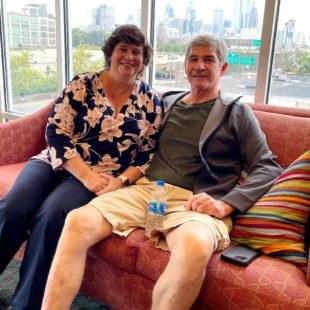Unraveling Emotional Issues while Awaiting a Transplant
Waiting to receive a new organ can be a long, trying process for patients and families alike.
Unraveling Emotional Issues while Awaiting a Transplant
By: Talia Giordano, MSW, LSW
Gift of Life Howie’s House Social Worker
When initially being evaluated for a transplant, patients and families may be overwhelmed with many different medical appointments and tests, and feel stressed and overwhelmed by the new information and questions. Once a person is deemed eligible for a transplant and is listed, the constant contact with the transplant team may lessen and the patient and family are in a “holding pattern.” Their job is to wait. Patients and families often experience anxiety and depression during the “wait” and it can be very difficult for them to live their lives.
One transplant recipient described the emotional strain the transplant process had on him and his wife, especially during the “wait process” for a new organ. During the waiting period, patients and family members may become depressed and have difficulty coping with their situation. Why would someone become upset when they are waiting for a new life?
Many recipients have described being anxious daily because they did not know if they would have to quickly get to the hospital that day. Others have described the fear of dying if they did not get their new organ quick enough. Family members and caregivers have similar emotional reactions.
In addition to caregivers trying to support their family during the difficult wait process, they are also often afraid of what could happen to their loved one. And certainly, anxiety for some may stem from a realization that someone else must pass away in order for them to live… and that in fact is what they are waiting for while on the list.
Symptoms of depression or anxiety should never go untreated or ignored. Some symptoms to watch out for are: increased or decreased sleep, increased or decreased appetite, crying spells, feelings of hopelessness, feelings of guilt, fatigue or loss of energy, and thoughts of suicide. People experience depression and anxiety differently, so symptoms may be very different.
How do you get treatment if you feel depressed or anxious? Your transplant social worker can help work through all of these feelings and then discuss further options for support or treatment, if needed. Further treatment can include individual counseling, a support group, family counseling, or even medication. If you or a family member has thoughts of suicide, seek help immediately from your local hospital emergency room.
Many patients and families can benefit from support groups – before or after a transplant. Support groups allow for a patient and/or family members and caregivers of patients to express their feelings. Through the support of other transplant recipients, the patients and their families can talk to others who have gone through the same issues. Your transplant social worker can also help you locate a support group in your area.
The Caregiver Lifeline Program at Gift of Life Howie’s House can also be a resource for patients and their families if they are feeling lost. Patients and families do not deserve to feel sad or lonely while waiting for a new life. Do not be afraid to ask for help from your transplant social worker, or the Howie’s House Social Worker. Just because someone is awaiting a transplant and a second chance at life does not mean he or she should not have a satisfying and meaningful life while waiting.






